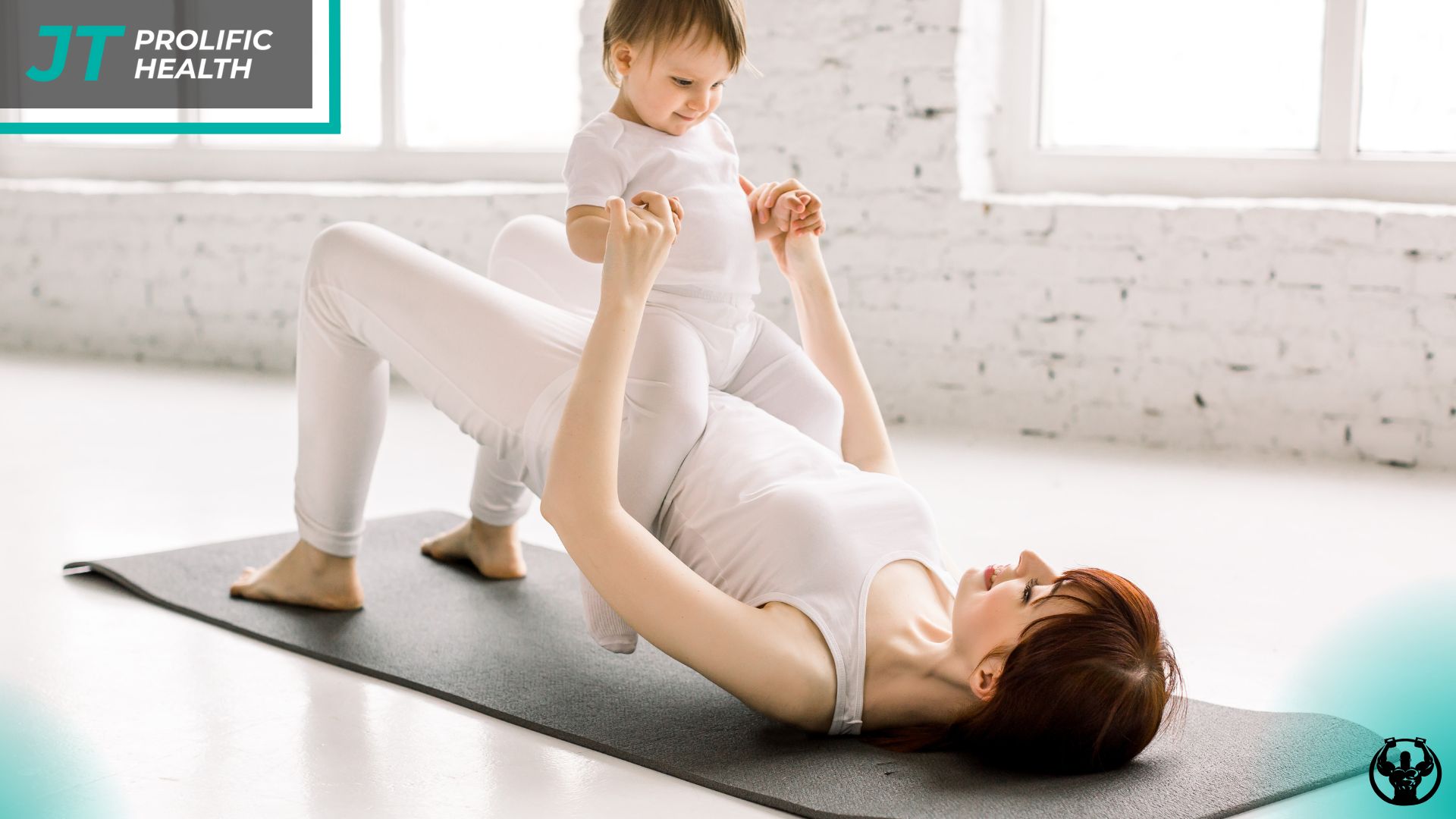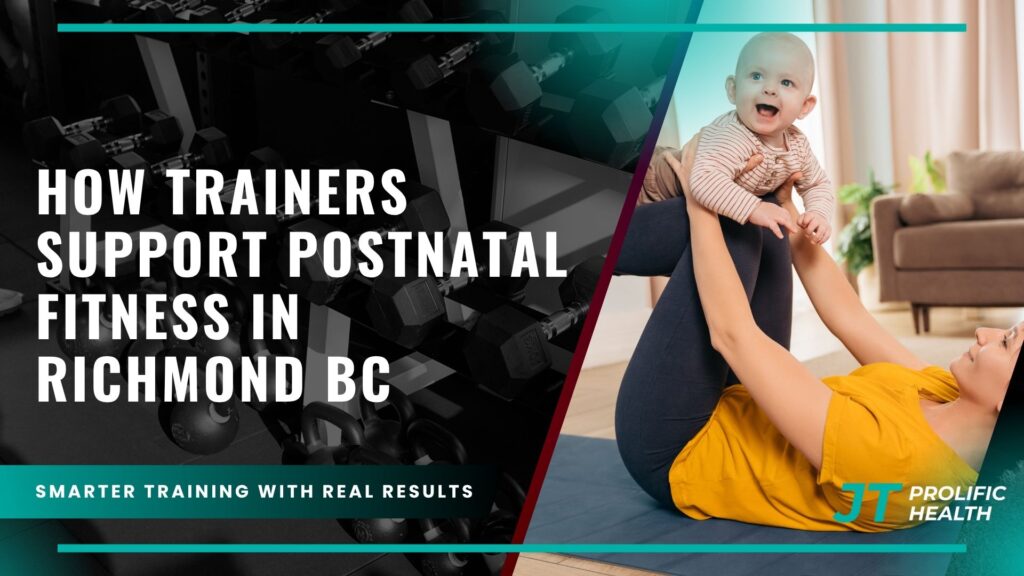The postnatal period represents one of the most transformative yet challenging phases in a woman’s life. After months of pregnancy and the physical demands of childbirth, new mothers in Richmond BC face the complex task of rebuilding their strength, energy, and confidence while adapting to the demands of caring for a newborn. The journey back to fitness isn’t simply about losing baby weight—it’s about restoring core function, addressing postural changes, rebuilding cardiovascular endurance, and creating sustainable habits that support long-term health and wellness.
Personal trainers who specialize in postnatal fitness understand that this recovery process is deeply individual and requires a comprehensive approach that goes far beyond traditional workout routines. Every woman’s postnatal experience is unique, influenced by factors such as the type of delivery, complications during pregnancy or birth, previous fitness levels, breastfeeding status, sleep patterns, and the level of support available at home. This complexity demands expertise, patience, and a thorough understanding of the physiological and psychological changes that occur during the postnatal period.
In Richmond BC, qualified personal trainers are increasingly recognizing the importance of specialized postnatal fitness programs that address the specific needs of new mothers. These professionals bring together knowledge of exercise science, postnatal physiology, and practical experience to create safe, effective, and realistic fitness plans that work within the constraints of new motherhood. They understand that success isn’t measured solely by physical metrics but also by improvements in energy levels, mood, confidence, and overall quality of life.
The support provided by experienced trainers extends beyond exercise prescription to include education about postnatal recovery, guidance on managing common challenges like diastasis recti and pelvic floor dysfunction, and the emotional support that comes from working with someone who understands the unique pressures facing new mothers. This holistic approach recognizes that postnatal fitness is not just about physical recovery but about helping women rediscover their strength, both physically and mentally, during this significant life transition.
Key Takeaways
For additional context, see this comprehensive guide.
- Specialized Assessment is Essential: Qualified trainers conduct comprehensive postnatal assessments that evaluate core function, pelvic floor health, postural changes, and overall physical readiness before beginning any exercise program.
- Progressive Exercise Programming: Effective postnatal fitness begins with foundational movements focusing on breathing, core stabilization, and gentle mobility before progressing to more challenging exercises based on individual recovery rates.
- Addressing Common Postnatal Issues: Professional trainers are equipped to help manage diastasis recti, pelvic floor dysfunction, upper back tension, and other common postnatal physical challenges through targeted exercise interventions.
- Flexible Scheduling and Realistic Expectations: Understanding the unpredictable nature of life with a newborn, experienced trainers offer flexible scheduling options and help set realistic, achievable goals that accommodate the demands of new motherhood.
- Comprehensive Lifestyle Support: Beyond exercise, trainers provide guidance on nutrition during breastfeeding, sleep optimization strategies, stress management techniques, and building sustainable healthy habits that fit into a busy mother’s lifestyle.
- Mental Health and Confidence Building: Professional support includes addressing body image concerns, building confidence in physical capabilities, and providing the emotional encouragement necessary for long-term success in fitness and wellness goals.
- Safe Return to Activities: Trainers help new mothers safely return to pre-pregnancy activities, sports, or fitness routines while respecting the body’s recovery timeline and preventing injury or setbacks.
Understanding Postnatal Fitness Needs in Richmond BC

For additional context, see detailed information on this topic.
The postnatal period, medically defined as the first year after childbirth, presents unique physiological challenges that require specialized knowledge and approach. During pregnancy, a woman’s body undergoes significant changes including hormonal fluctuations, postural adaptations, core muscle stretching, and cardiovascular adjustments. After delivery, the process of recovery involves not just returning to pre-pregnancy function but often achieving better health and fitness than before.
In Richmond BC’s diverse community, personal trainers encounter women from various cultural backgrounds, each bringing different perspectives on postnatal recovery, family support systems, and fitness expectations. This diversity requires trainers to be culturally sensitive while maintaining evidence-based practices that ensure safety and effectiveness. The climate and lifestyle in Richmond also influence how postnatal fitness programs are structured, with considerations for outdoor activities, seasonal variations, and the active lifestyle that many BC residents maintain.
Professional trainers understand that postnatal recovery occurs in phases, each with specific considerations and limitations. The immediate postpartum period (first 6-8 weeks) focuses primarily on rest, gentle movement, and allowing the body to heal. The early postnatal phase (2-6 months) typically involves gradually reintroducing structured exercise while monitoring for any complications or concerning symptoms. The extended postnatal period (6-12 months and beyond) allows for more intensive training while still respecting the ongoing effects of breastfeeding, sleep deprivation, and lifestyle adjustments.
The role of qualified trainers extends beyond exercise prescription to include education about normal versus concerning symptoms during recovery. They help new mothers understand when to seek medical attention, how to modify exercises based on daily energy levels, and how to listen to their bodies throughout the recovery process. This educational component is crucial for building confidence and ensuring that women feel empowered to make informed decisions about their health and fitness journey.
Comprehensive Assessment and Personalized Programming


For additional context, see our in-depth resource.
The foundation of effective postnatal fitness support begins with a thorough assessment that goes far beyond standard fitness evaluations. Qualified personal trainers in Richmond BC who specialize in postnatal fitness conduct comprehensive screenings that evaluate multiple aspects of a new mother’s physical condition, lifestyle, and goals. This assessment process typically includes evaluation of core function, checking for diastasis recti (abdominal separation), assessing pelvic floor function, examining posture and alignment, and discussing any ongoing physical concerns or limitations.
The assessment also includes a detailed discussion of the pregnancy and delivery experience, as this information significantly influences the recovery timeline and exercise recommendations. Factors such as cesarean delivery versus vaginal birth, length of labor, use of interventions during delivery, and any complications all impact how quickly and safely a woman can return to various types of physical activity. Trainers also consider current lifestyle factors including sleep patterns, breastfeeding status, childcare responsibilities, and available time for exercise.
Based on this comprehensive evaluation, trainers develop highly personalized exercise programs that respect the individual’s current fitness level, recovery status, and practical constraints. These programs typically begin with foundational exercises focusing on breathing patterns, gentle core activation, and basic mobility work. The progression is carefully monitored and adjusted based on the client’s response, energy levels, and any changes in their circumstances or health status.
Professional trainers understand that postnatal programming must be flexible and adaptable. What works one week may need to be modified the next based on factors like sleep deprivation, growth spurts affecting breastfeeding, or simply the unpredictable nature of life with a young child. This flexibility requires trainers to have multiple exercise options available and the expertise to make real-time adjustments while maintaining program effectiveness and safety. Many experienced trainers find that developing proper movement patterns is crucial for long-term success in postnatal fitness recovery.
Addressing Common Postnatal Physical Challenges


One of the most valuable aspects of working with qualified personal trainers during the postnatal period is their ability to address common physical challenges that many new mothers experience. Diastasis recti, the separation of abdominal muscles that occurs during pregnancy, affects a significant percentage of women and requires specific exercise interventions to promote healing and restore function. Trainers skilled in postnatal fitness understand how to assess the severity of diastasis recti and implement appropriate exercise progressions that support the natural healing process.
Pelvic floor dysfunction is another common concern that specialized trainers are equipped to address through education and appropriate exercise selection. While trainers cannot provide the same level of intervention as pelvic floor physiotherapists, they can teach proper breathing techniques, coordinate pelvic floor activation with core exercises, and recognize when referral to a healthcare provider is necessary. This collaborative approach ensures that women receive comprehensive care for complex issues that may require multiple healthcare professionals.
Postural changes resulting from pregnancy, childbirth, and the demands of caring for an infant create additional challenges that require targeted intervention. The forward head posture, rounded shoulders, and increased thoracic kyphosis common in new mothers can lead to pain, dysfunction, and decreased quality of life if not addressed. Experienced trainers incorporate specific exercises to strengthen weakened muscles, stretch tight areas, and retrain proper movement patterns that support better posture throughout daily activities.
Beyond these specific conditions, trainers help address the general deconditioning that often occurs during pregnancy and the early postnatal period. This includes rebuilding cardiovascular endurance, restoring muscle strength and power, improving flexibility and mobility, and enhancing overall functional capacity. The approach is systematic and progressive, ensuring that improvements are sustainable and that the risk of injury or setback is minimized. For busy new mothers, understanding how professional support can fit into demanding schedules becomes essential for maintaining consistency in their fitness journey.
Mental Health and Confidence Building Support
The psychological aspects of postnatal recovery are just as important as the physical components, and qualified personal trainers play a crucial role in supporting mental health and building confidence during this vulnerable time. Many new mothers struggle with body image concerns, feeling disconnected from their physical selves, and uncertainty about their capabilities. The combination of hormonal changes, sleep deprivation, and the dramatic life changes associated with becoming a mother can significantly impact mental health and self-esteem.
Professional trainers who specialize in postnatal fitness understand the importance of creating a supportive, non-judgmental environment where women feel safe to express concerns and work at their own pace. They recognize that progress may be inconsistent and that setbacks are normal parts of the recovery process. This understanding helps create realistic expectations and prevents the frustration and disappointment that can occur when progress doesn’t follow a linear path.
The confidence-building aspect of postnatal training extends beyond physical achievements to include helping women rediscover their strength and resilience. Many new mothers are surprised by what their bodies can accomplish after pregnancy and childbirth, and working with a supportive trainer can help them recognize and celebrate these achievements. Small victories, such as completing a workout despite being tired or feeling stronger during daily activities, contribute to an improved sense of self-efficacy and overall well-being.
Trainers also provide valuable perspective on the normal challenges of new motherhood, helping women understand that struggling with energy, motivation, or physical limitations is not a personal failure but a natural part of the adjustment process. This normalization of common experiences can be incredibly reassuring for women who may feel isolated or inadequate. The social support provided by trainers, whether in individual sessions or group settings, contributes significantly to mental health and helps combat the isolation that many new mothers experience. Research shows that professional fitness support can significantly impact self-confidence and overall well-being during major life transitions.
Practical Lifestyle Integration and Long-term Success
Successful postnatal fitness programs must integrate seamlessly into the complex reality of life with a new baby. Experienced personal trainers in Richmond BC understand that traditional fitness approaches often don’t work for new mothers who are dealing with unpredictable schedules, varying energy levels, and competing priorities. They develop strategies that make fitness accessible and sustainable within the constraints of new motherhood, focusing on efficiency, flexibility, and realistic goal-setting.
One key aspect of practical integration involves teaching new mothers how to incorporate movement and exercise into their daily routines. This might include exercises that can be done while the baby sleeps, movements that can be performed while playing with the child, or quick routines that fit into short windows of available time. Trainers also provide guidance on home workout options, helping women create effective exercise routines that don’t require gym access or childcare arrangements.
Nutrition support is another crucial component of comprehensive postnatal care, particularly for breastfeeding mothers who have increased caloric and nutritional needs. Qualified trainers provide evidence-based guidance on fueling the body for recovery and energy while supporting milk production. They help women understand how to balance weight management goals with the need for adequate nutrition and energy, avoiding restrictive approaches that can negatively impact health and well-being.
Long-term success in postnatal fitness requires building sustainable habits rather than relying on short-term intensive programs. Trainers help women develop a healthy relationship with exercise and movement that will serve them throughout their lives. This includes teaching them how to modify workouts based on life circumstances, how to maintain fitness during busy periods, and how to return to routine after breaks or setbacks. The goal is to create a foundation of knowledge and skills that enables women to maintain their health and fitness independently while knowing when to seek professional support. Many women find that working with professionals who understand comprehensive lifestyle modifications helps them achieve more sustainable results than focusing solely on exercise.
Choosing the Right Professional Support
Selecting the appropriate personal trainer for postnatal fitness is a critical decision that can significantly impact both safety and success. Not all fitness professionals have the specialized knowledge and experience necessary to work effectively with postnatal clients, making it essential for new mothers to understand what qualifications and characteristics to look for when seeking professional support.
Relevant certifications and continuing education in postnatal fitness are fundamental requirements for any trainer working with new mothers. These specialized credentials ensure that the trainer understands the physiological changes of pregnancy and recovery, contraindications for exercise, and appropriate progressions for this population. Additionally, experience working with postnatal clients provides practical knowledge that complements formal education, helping trainers anticipate common challenges and develop effective solutions.
The trainer’s approach to assessment and program design should be thorough and individualized, taking into account the client’s specific circumstances, goals, and limitations. Red flags include trainers who use generic programs without proper assessment, those who push too hard too fast, or professionals who don’t seem to understand the unique challenges of the postnatal period. A qualified trainer should be able to explain their recommendations, answer questions about safety and modifications, and demonstrate flexibility in their approach.
Communication style and personality fit are also important considerations, as the trainer-client relationship during the postnatal period often involves discussing personal and sensitive topics. New mothers should feel comfortable expressing concerns, asking questions, and communicating about their physical and emotional state. The trainer should be supportive, patient, and understanding of the challenges associated with new motherhood.
At Prolific Health, our trainers understand the unique needs of postnatal clients and provide comprehensive support that addresses both physical and emotional aspects of recovery. Our team stays current with the latest research and best practices in postnatal fitness, ensuring that clients receive safe, effective, and evidence-based care throughout their recovery journey. For those just beginning their search for professional support, understanding how to assess trainer qualifications can help ensure you find the right fit for your specific needs.
Frequently Asked Questions
When is it safe to start exercising after giving birth?
The timing for returning to exercise varies depending on the type of delivery and individual recovery. Generally, women who had uncomplicated vaginal deliveries may begin gentle exercise after receiving medical clearance at their 6-week postpartum checkup. Those who had cesarean sections typically need to wait until 8-12 weeks or until cleared by their healthcare provider. However, gentle walking and breathing exercises can often begin much earlier.
What types of exercises should be avoided during postnatal recovery?
High-impact activities, heavy lifting, intense abdominal exercises, and activities that increase intra-abdominal pressure should generally be avoided in the early postnatal period. Exercises that cause doming or bulging of the abdominal muscles may indicate diastasis recti and should be modified. Your trainer should assess your individual situation and provide specific guidance based on your recovery status.
How can I exercise when I’m constantly tired from lack of sleep?
Qualified trainers understand that fatigue is a major challenge for new mothers and can modify programs accordingly. Gentle movement, even for short periods, can actually help improve energy levels. Trainers can teach you how to adjust workout intensity based on your energy levels and provide alternatives for days when you’re particularly tired.
Is it safe to exercise while breastfeeding?
Yes, exercise is generally safe and beneficial while breastfeeding. However, it’s important to stay well-hydrated, maintain adequate nutrition, and wear a supportive sports bra. Some women find that feeding the baby or pumping before exercise is more comfortable. Your trainer can help you plan workout timing around your feeding schedule.
How do I know if I have diastasis recti and what should I do about it?
Diastasis recti can be assessed through a simple self-check or professional evaluation. Signs include a visible bulge or doming when doing abdominal exercises. A qualified postnatal fitness trainer can assess the separation and provide appropriate exercises to support healing. Severe cases may require referral to a physiotherapist.
What should I do if I experience pain during or after exercise?
Any pain during exercise should be taken seriously and addressed immediately. Stop the activity causing pain and inform your trainer. Persistent pain, especially in the pelvic area, back, or abdomen, may require medical evaluation. A good trainer will always prioritize your safety and comfort over pushing through discomfort.
How long does it take to see results from postnatal fitness training?
Results vary significantly depending on individual factors, but many women notice improvements in energy and mood within a few weeks of starting a consistent program. Physical changes typically become noticeable after 6-8 weeks of regular exercise. Remember that progress isn’t always linear, and setbacks are normal during the postnatal period.
Can I do postnatal fitness training if I had complications during pregnancy or delivery?
Women who experienced complications may still benefit from postnatal fitness training, but this requires careful coordination with healthcare providers and specialized expertise from the trainer. Always obtain medical clearance before beginning any exercise program, and ensure your trainer is informed about any complications or ongoing health concerns.
Conclusion
The journey of postnatal fitness recovery is deeply personal and requires professional support that understands the complex interplay of physical, emotional, and practical challenges facing new mothers. Qualified personal trainers in Richmond BC who specialize in postnatal fitness provide invaluable support that extends far beyond traditional exercise instruction, offering comprehensive care that addresses the whole person during this transformative time.
The benefits of working with experienced professionals include safe and effective exercise programming, education about postnatal recovery, support for common physical challenges, and the emotional encouragement necessary for long-term success. These trainers understand that progress may be inconsistent, that flexibility is essential, and that success is measured not just by physical achievements but by improvements in overall quality of life, energy, and confidence.
For new mothers in Richmond BC considering professional fitness support, the investment in qualified postnatal training can provide benefits that last far beyond the immediate recovery period. By building a strong foundation of knowledge, skills, and healthy habits, women are better equipped to maintain their health and fitness throughout the demands of motherhood and beyond. The key is finding the right professional who combines appropriate qualifications with understanding, patience, and a commitment to supporting each woman’s unique journey back to health and strength.




